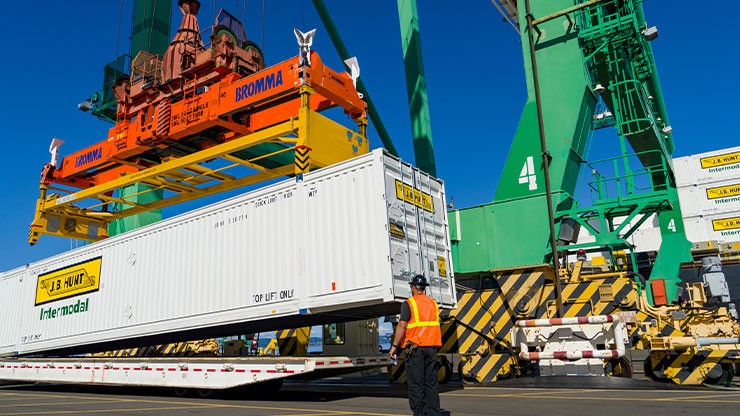Overcoming the Complexity of International Shipping

Knowing we need to do everything we can to help alleviate supply chain congestion at the ports, J.B. Hunt has launched its first transload service. Through this new service, J.B. Hunt will help customers in the New York metro area who are experiencing congestion at a critical time.
The new service will be managed through a recently expanded, strategically placed facility near Jersey City, New Jersey. Within the 25,000-square-foot transloading warehouse space, we can take freight that has arrived via East Coast waterways and provide a variety of outbound options for our customers. At the site, J.B. Hunt transloads palletized and floor-loaded cargo into equipment for domestic transport, allowing us to quickly streamline inland movements.
Shippers can use our Intermodal and Highway Services offerings to move freight outbound from the facility, providing line-haul capacity to anywhere in the U.S. And with one of the largest company-owned fleets in North America, J.B. Hunt can help customers improve the agility of their supply chain. J.B. Hunt makes the process even more efficient by handling port drayage and final door delivery, along with arranging for services like sorting, labeling, palletization and shrink wrap.
This new service offering allows J.B. Hunt to continue to provide options for our customers. From sea to rail to highway, our multi-modal platform helps create solutions. It’s one more way J.B. Hunt helps navigate the tricky waters of international shipping.
Here are some of the other ways we help customers ensure their products are moving efficiently as possible:
International Challenges and Watch-Outs
It’s not surprising that border crossings present a number of challenges themselves. Regardless of how freight is moved between countries, it’s important to understand the processes and regulations for crossing borders. Shipments will undergo customs checks to gain approval for entry to each country those goods are moving into. Every country has unique requirements about how and what is allowed to cross its borders. It’s important to keep a watch on the regulations for countries you frequently ship to as these requirements can change.
Alternatively, establishing a relationship with customs brokers who stay up to date on changing regulations and help successfully navigate border crossings is an option. Mode selection is also an important factor to consider. One key to efficient border crossings is to remain mode neutral. Being a mode-neutral shipper means you are open to the best transportation method to move freight. For example, to avoid transloading altogether shipments crossing North American borders can be executed through an intermodal move where goods are transported from one country to another primarily using rail. Moving goods via rail may eliminate some of the delays that can happen with truckload border crossings and potentially increase on-time service. Understanding which shipping mode, or blend of modes, will provide the best combination of cost and service can improve supply chain efficiency and customer satisfaction.
Leveraging Expertise to Navigate International Freight Moves
The above examples are just a few basic considerations for international shipping. Many companies will opt to have a third party that has international shipping solutions execute the freight moves in order to avoid the many pitfalls that can occur from uninformed shipping decisions.
On-site Personnel
Since many international freight shipment issues are experienced at the border, local personnel can be one of the most valuable resources at your disposal. A knowledgeable, on-site logistics team can interface directly with customs and border crossing agencies to resolve administrative and operational issues that can prevent your shipments from moving to their destination. With time zone differences and language barriers potentially adding to confusion, trying to resolve these issues on your own from a distance could possibly slow down, or even stall the process. Experienced, on-site personnel will speak the language of logistics and navigate an uncharted course on your behalf to ensure your shipments keep moving.
Specialized Experience
As previously mentioned, each country has unique rules and laws that impact the movement of goods across its borders. A third-party provider can bring a wealth of knowledge in these specific governance concerns and can collaborate with your company to develop individualized strategies for avoiding problems during border crossings and pre-set action plans for resolving issues when they do occur. Your chosen provider should bring together their understanding of your company’s shipping needs with their well-established relationships with carriers and governing agencies to help streamline your cross-border shipments.
Supporting Technology
Communication and shipment visibility are key components in establishing a trustworthy relationship with an outsourced logistics provider. Ideally, your chosen provider will also have made investments in technologies and tools that facilitate both of these. Logistics technologies and automatic notifications can assist with tracking shipments and proactive planning with pick-up and delivery facilities for appointment setting and exception management. While phone calls and manual email communication can be complicated by time zone gaps and working hours, shipment updates can happen around the clock, seven days a week.
Ready to get moving?
Whether you’re a seasoned shipper or new to international shipping, J.B. Hunt can help you create a plan for efficient, reliable logistics in the U.S., Canada, Mexico and select regions in Asia, including China. Connect with us to see how we can keep your goods moving.

